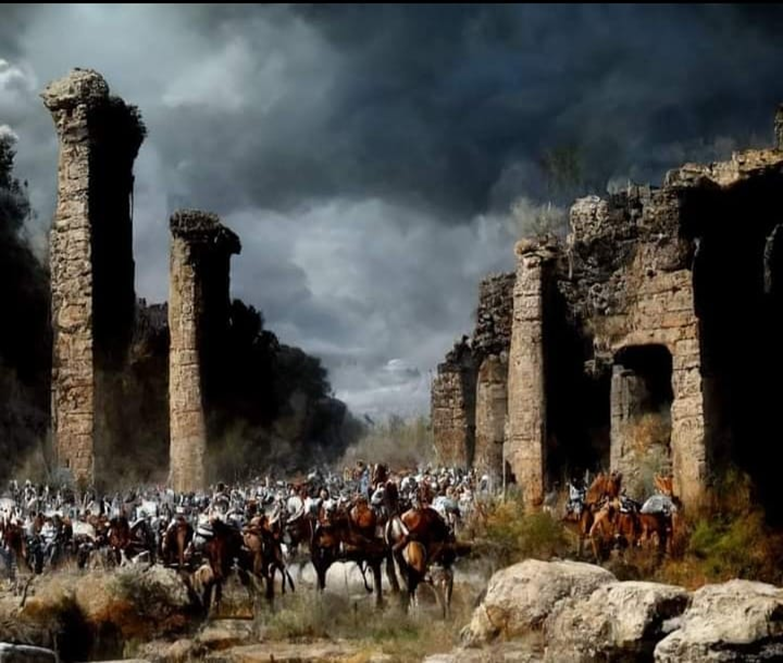Battle of Southall

The events of this battle (part of the Jugurtha War) took place during Albinus' campaign (110 BC) in Sothul (near Guelma) between the forces of King Jugurtha and Aulus, brother of Albinus. It ended with Jugurtha's victory and the evacuation of the Roman forces from Numidian lands.
Albinus renewed the military operations and hastened to transport supplies to Africa and money to pay salaries to the soldiers. He immediately set off, wishing, with weapons or surrender, to end the war before the elections that were approaching. Jugurtha, on the contrary, tried according to time, inventing one pretext after another, and paving the way for the consul’s attack, and then, in order for his soldiers not to lose their courage, he attacked them. In turn, the consul was thus puzzled by the delays of war and now by the delays of peace. When the time of the elections approached, Albinus sailed to Rome, leaving his brother Aulus in charge of the camp.

The competition was intense in the Roman Commonwealth due to divisions and opposition, which hindered the elections for the whole year. Because of this delay, Aulus, who was in charge of the camp, was inspired with the hope of ending the war or forcing the king to bribe him out of fear of his army, so he summoned the soldiers in January from their winter quarters. For active service in the field, they marched despite the harsh winter until they reached the city of Southall, where the king's treasure was kept. He could not besiege it due to bad weather conditions and the strength of its defenses. It was surrounded by walls that were built on the edge of a steep slope. It was a muddy plain due to the winter rains. However, either By deception in order to frighten the king or because he was blinded by the desire to seize the city for its treasures He raised the shelves, built a mound, and quickly made other preparations for the attack. Jugurtha, however, was aware of Aulus' ignorance and took advantage of that ignorance by sending suitable envoys. While he himself was trying to avoid confrontation, he led his army across the wooden paths. Finally, by adhering to the agreement, he urged Aulus to leave Seuthul and follow him in an alleged retreat. For the outlying areas, Jugurtha was meanwhile working to attack the Roman army through his envoys bribing the cavalry commanders to escape or abandon their positions at a certain signal.

After things were arranged as the king had planned, in the dead of night, the Aulus camp was suddenly surrounded by a crowd of Numidians. The Roman soldiers were frightened by this unusual disturbance. Some of them took up their weapons and others hid. Panic prevailed in the entire camp. The Numidian forces were large. It was dark and danger was everywhere, no matter what path they took. Then, from among those who had received a bribe, a group of Ligurians with two squadrons of Taracians and a few soldiers headed to the king, while the commander of the third legion gave the Numidians an opportunity to enter the fortified part that had been appointed to guard it, and there the Numidians stormed. The place and they killed a large number of soldiers, and the others fled or surrendered. The camp was completely looted. Then, the next day, Jugurtha held a conference with Aulus. He said that the general and his army were at the mercy of the sword. However, if Aulus concluded a treaty with him, they would be released on the condition that Aulus left Numidia in ten days. Although the conditions were difficult and humiliating, but because they were offered in exchange for the fear of death, peace was accepted on the king's terms.

When the news of this disaster reached Rome, fear and sadness seized everyone. Some mourned for the glory of the empire, others feared for their freedom. All the men of war were indignant with Aulus because, by holding weapons in his hands, he sought safety through shame instead of fighting. Therefore, the consul Albinus rose up for fear of disgrace. Shame on his brother's behavior by raising the issue of the treaty before the Senate, but in the meantime he registered reinforcements from the allied peoples. The Senate decided that no treaty could be binding without his order and ordered the people. As expected, the tribes that had sent their forces prevented the Albinos from raising it, but within days A few left for Africa because the entire army withdrew from Numidia according to agreement and was spending the winter in that province, but although Albinus was keen to pursue Jugurtha and atone for his brother's defeat and disgrace. However, knowing his soldiers who were frustrated and weak not only because of their defeat but also because of the cheapness and immorality resulting from laziness and indolence, he decided that he was not in a good position to take any step.
Source: websites

